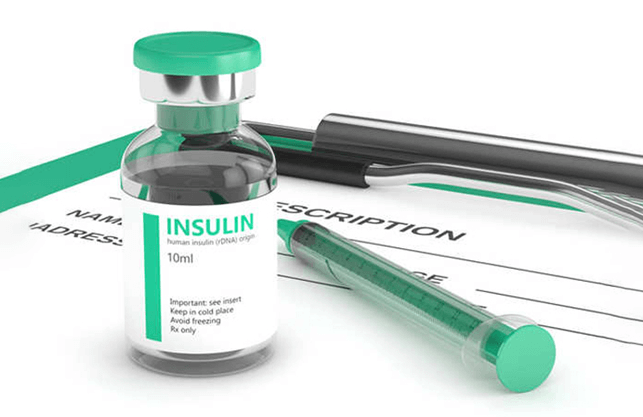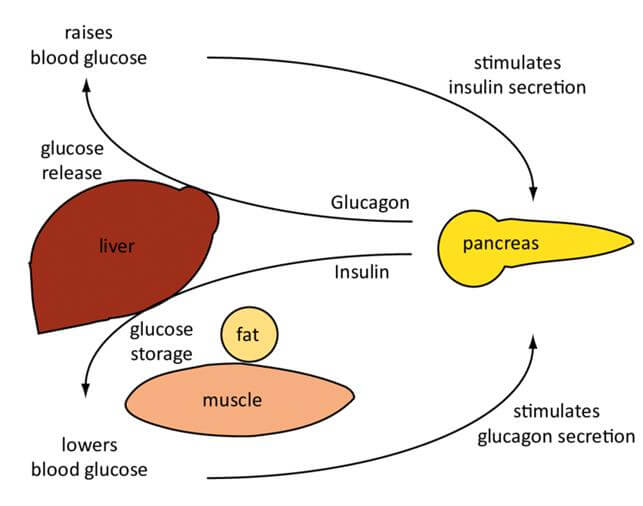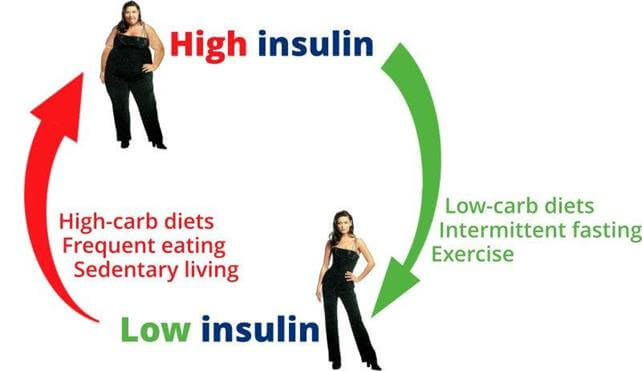Definition and function of insulin in the body. What is the cause of insulin resistance? What type of diabetes is insulin resistance?
What is Insulin
Insulin is a hormone produced by the pancreas. Insulin’s job is to shuttle glucose (sugar) out of the bloodstream and into the body’s cells (the tiny components of all parts of our bodies). This helps nourish the body’s cells and keeps the blood sugar level from climbing too high.
Insulin is one of the most important hormones in the human body and your diet. Most people think of diabetes when it comes to insulin. Some people need to inject themselves with insulin or receive insulin injections to lower their blood glucose (blood sugar). But even if you don’t have diabetes, insulin still plays a critical role in weight problems.

What is insulin (source: hotangduong)
Function of insulin in the human body (3 functions)
1. Regulating your blood glucose level
Every time we eat, a massive amount of sugar enters the bloodstream after the food is digested in the stomach. Our body needs to adjust quickly so that the blood glucose can be delivered to the cells for use. So what regulates blood sugar? The answer is insulin, a hormone produced by beta cells in the pancreas.
Our bodies secrete insulin just before and during eating, so that the insulin signals the liver, muscles, and fatty tissues to take up sugar from the blood (thus lowering blood glucose levels). Insulin binds to insulin receptors in muscle cells, signaling the cells to absorb the glucose from the bloodstream and store it as glycogen.
When blood glucose levels drop, insulin secretion slows or stops. To protect against too low blood sugar (known as hypoglycemia or low blood glucose), another hormone called glucagon stimulates cells to break down glycogen into glucose. And thanks to that, the balance is maintained.
However, if blood glucose levels are still high, the beta cells will produce and release more insulin in pulses every ten to twenty minutes, until blood glucose returns to normal. The function of insulin in the human body is to control blood sugar

Regulating your blood glucose level (Source: beatoapp)
2. Insulin deficiencies and disease
Diabetes is often associated with insulin problems. Untreated diabetes can lead to organ damage such as blindness, amputation, infections, and kidney failure. There are two types of diabetes:
2.1 Type 1 diabetes
Type 1 diabetes is caused by a lack of insulin produced by the pancreas. Type 1 diabetes, which accounts for 10% of all diabetes cases, usually affects younger children born with a condition in which the immune system destroys the insulin-producing cells in the pancreas. This causes their bodies to produce little or no insulin. As a result, the body cannot store the food eaten as fat, and it also burns all the fat in the body. These children are often very thin.
2.2 Type 2 diabetes
Type 2 diabetes is when the body still has insulin, but the receptors in the cells are resistant to insulin. And the result is high and uncontrolled blood sugar. Type 2 diabetes is common in obese adults.
Unlike type 1 diabetes, the body does not produce insulin. Type 2 diabetes is caused by long-term high insulin levels. Remember, insulin is a fast-acting hormone, with its primary job being to bring down blood sugar. If you maintain a high-carbohydrate diet, your insulin levels will remain high. Over time, the insulin receptors become desensitized to insulin and will not be able to do their job well.
With insulin resistance, people with type 2 diabetes may need insulin injections to control blood sugar. The function of insulin in the human body used to treat diabetes.
2.3 What is insulin resistance
The more carbohydrates and sweets we eat, the more insulin the pancreas has to produce. Over time, excessive insulin wears down the cells’ insulin receptors, leading to insulin resistance.
In order for insulin to bind well to the insulin receptors, the pancreas must produce more insulin. And like every other overworked situation, the pancreas fails and cannot produce insulin as it should.
When you develop insulin resistance, the ability of brain cells to absorb sugar is reduced, thus brain function. This leading to an increased risk of mild cognitive impairment (MCI), a condition in which people experience more memory problems than are usually present in normal aging and in dementia.
3. Insulin and weight management
What we eat affects how much insulin our body produces. The more carbohydrates and sweets you eat, the more insulin your body produces. Over time, it can lead to insulin resistance.
When insulin binds to insulin receptors in the brain, muscle, and liver cells, it promotes glucose absorption and storage as glycogen. Brain, muscle, and liver cells have a limit on how much glycogen they can store. Once these storages are full, the body still needs to reduce the excess glucose in the blood and put it somewhere.
The insulin then binds to the insulin receptors of the fat cells, signaling the fat cells to absorb the excess glucose and store it as new fat cells. In addition, insulin tells fat cells to capture fatty acids in the blood, turn them into fat molecules, and store them as fat droplets.
=> Insulin causes the body to store fat by absorbing excess glucose or fatty acids into what is called “adipose tissue,” which is usually concentrated around the abdomen, hips, and thighs.
At the same time, high insulin levels do not allow the body to use fat for fuel, so the body cannot burn fat. Take in more fat, but your body can’t burn it. In addition, high insulin levels prevent the body from breaking down glycogen to convert it into glucose when blood glucose levels drop. Because the body can’t burn fat or break down glycogen to provide energy to cells, your body will make you crave carbohydrates, especially sweets, in order to get the amount of sugar it needs.

Function of insulin in the body: weight management (Source: vi.j-medic)
>>> Related Posts
Habits that make you lose weight effectively (6 natural habits)
Brown bread good for weight loss – 13 Healthy Sandwich Recipes
5 ways to keep your digestive system healthy
>>> References
Thinsulin – the breakthrough solution to help you lose weight and stay thin – Charles T.Nguyen